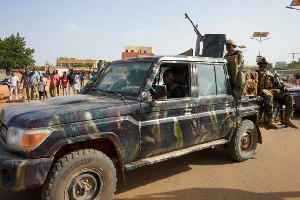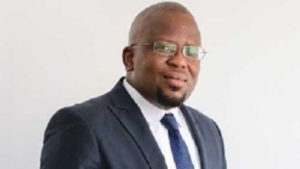The Director of the United Nations University Institute of Natural Resources(UNU-INRA), Dr. Fatima Denton has called on governments of African countries to invest in Geographic Information System(GIS) including other Geospatial technologies and be fully committed to building capacity of officials and different stakeholders in order to help detect and insulate their countries from potential natural disasters.
She averred that the GIS technology is a very powerful tool that is capable of processing data, its management, analysis and monitoring which if harnessed effectively can go a long way to positively impact the management of our natural resources including mitigating the harmful effects of the climate change.
“Some of these natural disasters are triggered by climate change while others are inclined naturally which have no link with it in terms of intensity and the frequency rate at which they are occurring so that tells us that GIS gives us in many ways an opportunity to better understand what these natural hazards can do to infrastructure, to people, to livelihood and how we can better create some sort of buffer that enables us to insulate ourselves from these natural hazards and negative impacts that they have on our economy”, she expounded.
Dr Fatima Denton made this known in an interview with the media on the sidelines of a 5-day intensive training workshop for professionals in resource management and research on Geographic Information Systems (GIS) and remote sensing in Accra on Friday October 12, 2018.
Dubbed: “GIS Training for Professionals in Resource Management and Research” is a five-day (8th-12th) intensive certificate course in Geospatial Technologies organized by UNU-INRA for professionals and decision makers in the resource management sector across Africa.
The course was aimed at equipping participants with concepts, functional skills, methods and techniques required for prescribing location specific solutions in addressing resource management challenges facing Africa today.
According to Seyram Kofi Loh, one of the program facilitators, it was intended to bring up to speed researchers as well as resource managers in application of GIS and remote sensing technology as data capturing and decision support tools geared towards effective research work.
In all, 15 professionals from diverse backgrounds including resource management and research, science students, soil science, electrical engineering, hydrogeology as well as the media partake in the 5-day training course. The participants were taken through GIS, Remote sensing, Global Positioning System(GPS), georeferencing and digitizing; a combination of hands-on and fieldwork (practicals) backed by theory.
The participants, made up of 14 Ghanaians and 1 Nigerian include David Wayne Butuacquah-Mensah (Electrical Engineer), Asabena Anokye Mensah (CEO, Anomena Ventures), Divine Ofori Ahadjie(student), Rich Kofituo (Research Assistant, IITA-Ghana), Efia Boakye Addo (Planning Assistant, Miro Forestry Ghana), Elorm Dzodzodzi(Student) and Joseph Kobla Wemakor (Editor-In-Chief, Ghananewsone.com). The rest are Prof. Daniel Okae-Anti (Prof in Soil Science UCC), Adetona Adeyemi (Chief Engineer, National Water Resources Institute, Kaduna, Nigeria), Samuel Mensah Turkson (Miro Forestry Ghana Ltd.), Emmanuel Ayine Ayimpusah(student), Samson Renner (Hydrogeologist, Global Communities-Ghana), Daniel Agyei (student), and Jeffrey Sumsoh (Reseacher, Noguchi Memorial Institute for Medical).
At the end of the program, participants received a certificate of participation which was presented by Dr Fatima Denton on behalf of UNU-INRA.
Prior to the presentation at a short ceremony, Dr. Denton encouraged participants to utilize the knowledge acquired to the fullest and to the benefit of themselves including the nation.
She appealed to them to always endeavor to keep in touch with the institute with feedback on how the knowledge acquired has benefited their works to inform the institute as to whether there’s the need to improve upon the training program to suit other stakeholders in the near future.
According to her, the GIS technology forms key part of the institute’s agenda owing to its relevance in collecting, analyzing and monitoring of data for that matter chosen as a flagship training program to augment better conservation and harnessing of the Africa’s natural resources.
For his part, UNU-INRA’s GIS Course Coordinator, Mr. Kwabena O. Asubonteng observed that the GIS technology as a tool has a major role in shaping Ghana’s economy in diverse ways but lamented most Ghanaians who are in possession of the knowledge have failed woefully in its application to work, instead have resorted to only “administrative work”.
“The other side of the problem is that some institutions have it and over the years trying to build up solid data to be applied in such systems but have also always been a challenge and we cannot run away from the benefits of the system”, he posited.
He suggested that the best way for Ghana to harness the full potential of the GIS technology is to see government erects a national spatial infrastructure to harmonize all data and manage its institutions, for example, the Ghana Water Company Ltd., ECG, GRA and the Forestry Commission among others to easily have access to data to inform its policies.
“Elsewhere all these mini systems are integrated at a central point where security people can use but everybody has a clearance level, so you cannot run away from data”, he explained.
Some participants who interacted with the media on the sideline of the 5-day program expressed satisfaction, fulfilment and eagerness to face their works with hope knowing very well they have been immersed in knowledge.
Professor Daniel Okae Anti, a participant and a lecturer in soil science department at the University of Cape Coast(UCC) maintained that being someone who uses geostatistical tools a lot in finding the variation of soil resources such as nitrogen, phosphorus and potassium among others, discovered that GIS technology and his field of work are related hence the motivation to undergo the course.
When asked about his overall assessment of the program, he said: It’s been useful 5-day program, however tight it is, I think we’ve managed to go through and I remarked that I really liked the combination of the theory and the hands-on exercises. And another impression is that looking at the background of the participants, I’ve also come to appreciate that GIS and remote sensing is not limited to only science biased people but all fields.” He furthered: “I mean those into humanities collecting data by questionnaires or what not, you could still pick up the questionnaire and find or attach a location to where you pick the sources so it’s an open material for all fields which is the most important thing.
UNU-INRA is one of the 15 Research and Training Centres/Programmes of the United Nations University(UNU). The aim of the Institute is to bridge the gap between science and natural resources management policies in Africa. Its mandate is to contribute to the sustainable development of Africa’s natural resources in a way that maintains the quality of the natural environment and transforms lives.
Business News of Monday, 15 October 2018
Source: Joseph Kobla Wemakor













